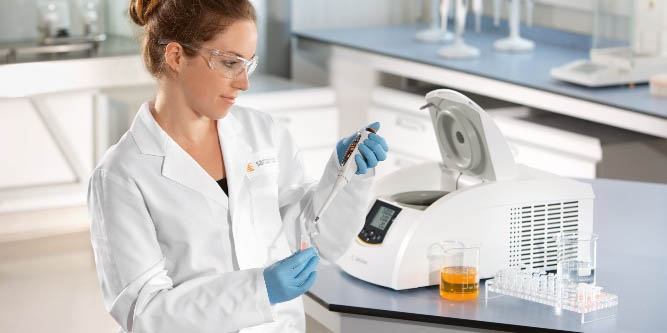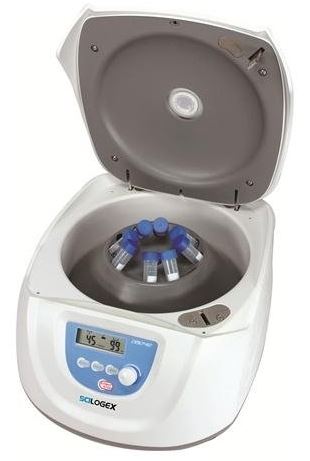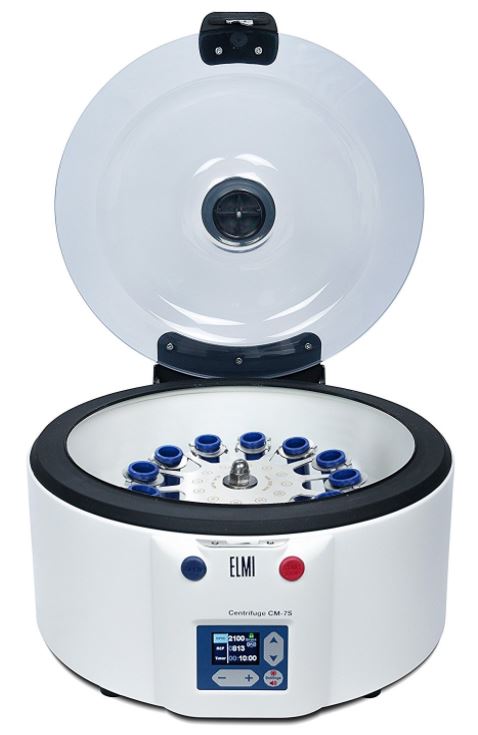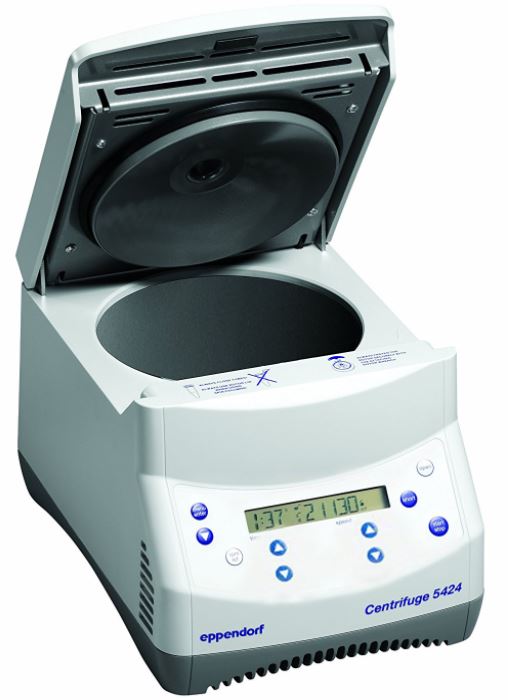In the simplest terms, a centrifuge is an instrument designed to spin quickly. Samples are held inside while suspended in liquid, and the centrifugal force of the spinning motion rapidly separates your samples into their constituent parts. Some of the most common uses of a centrifuge are for blood or DNA samples. A centrifuge can easily separate blood from plasma in only a few minutes of operation because the rotors inside a centrifuge are built to spin at incredible speeds. Although they’re most common inside clinical settings, centrifuges are also widely used in industrial, medical, and academic research.
That’s because centrifugation is a critical step of countless lab protocols. Routine use makes a centrifuge of central importance for or virtually any laboratory. Having the right centrifuge for your specific task can be so important that most labs in need of centrifugation will end up with several types of centrifuge. One instrument to another may vary by capacity, rotor type, testing parameters, or dozens of other factors.
However, some centrifuges are built with a versatile design that allows you to achieve multiple applications from a single workstation. They may have adjustable or even interchangeable rotor systems. Such centrifuges can help provide a variety of needs, and provide a versatile instrument that can still fit nearly inside a compact space.
In other words, a well-selected centrifuge can be a long term investment for a lab. As such, it’s a good idea to take stock of both the current and potential future needs of your testing. Having to purchase several centrifuges can sometimes be avoided by choosing a device that’s more capable of being adapted to future needs.
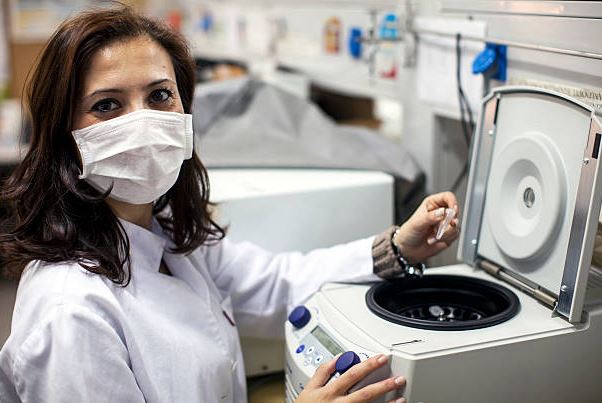
Choosing the Right Centrifuge
It’s also important to know what features to look for in choosing a centrifuge. It’s the only way to truly guarantee optimal performance, the best rotor life, and the safety of everyone in your lab. To that end, knowing all the reasons why you need a centrifuge is an essential first step.
For example, cell culture laboratories deal with extremely delicate cells and need highly reproducible speed, temperature, acceleration rates, and minimal vibration. Molecular biology labs generally need higher throughput and powerful refrigeration features for their samples. Clinical labs tend to seek centrifuges that can offer a constant sample temperature, and reasonably strong deceleration features.
Deceleration can be just as valuable as acceleration because having to wait almost a full minute for a centrifuge to safely spin down can greatly delay testing, especially if there’s a significant volume of testing to be done. That problem can become even worse when machines are being shared between colleagues. Knowing how many people will be using the instrument is another consideration to pay attention to when thinking about the instrument’s maximum capacity.
Sample Types and Related Considerations
You’ll want to ask yourself about the kinds of samples you’re spinning. From all your sample types, what are the relative centrifugal forces (RCF) you’ll need for each sample? Do you need a specific type of rotator for your sample, like a fixed angle or swinging rotor? What kind of throughput will your lab be putting on the shoulders of the device? Are you looking at 10 tests a day, or 15 tests an hour?
As the centrifuge spins, heat is created by the rotor’s friction. Temperature change inside the device may mean you need refrigeration to ensure the sample isn’t degraded, but it all depends on what you’re testing. If you’re going through dozens or hundreds of sample tubes each day, then seemingly marginal differences in capacity and size can make considerable differences in the efficiency and speed of centrifugal testing.
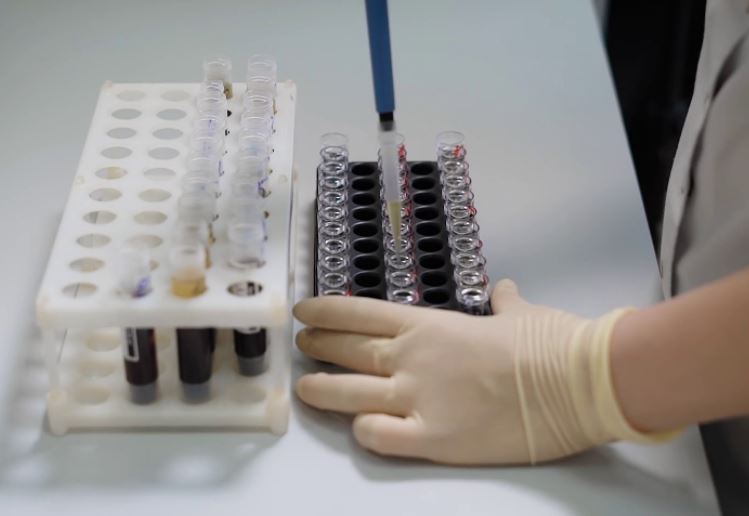
Benchtop Centrifuges
You can find many types of centrifuges. The best one for your purposes will depend largely on your performance requirements, how much space you have in your lab, and your budget. Many ordinary benchtop centrifuges are oriented towards offering speedy samples. Others emphasize flexibility, versatility, low cost, or safety, or convenience.
Clinical benchtop centrifuges are typically used for low-throughput testing, blood test, urine samples at relatively low speeds for diagnostic purposes. For those purposes, you might want to emphasize rapid testing times, or units sporting higher rates of RCF to handle a wider variety of sample types. The maximum RPM of a centrifuge matters to the extent that the machine can provide enough G-force for your samples. Some samples requiring smaller forces, and you may need to look for that as well.
RFC and Tube Capacity
Usually centrifuges offer a RCF of 3000 x G or lower, and standard 15 mL testing tube support. But some benchtops are high speed, offering higher g-forces in exchange for a more limited set of rotors. Others offer a low-speed, high volume setup. There’s a variety of options available, just remember the more you pack into a centrifuge, the bulker it tends to be.
Labs tend to be packed with equipment, so you’ll want to think about the kind of space that’s available. And again, you’ll want to think not only about your current needs, but the kind of future requirements your lab may need to satisfy. Thinking about the future may lean you towards a more adaptable selection.
User Protection
Sample containment is something else to consider. If you’re dealing with potential bio-contaminants, you need appropriate and reliable containment. Seemingly small features like transparent lids may help technicians see damaged tubes before they open the machine, which adds a layer of safety. You may also want to ask how easy rotor installation is, especially if you’re using a device with multiple rotors.
Rotary accidents are rare. But when they happen, the destruction of your sample is often times a best case scenario. A rapidly spinning rotor that gets loose may damage the centrifuge, damage other materials in the vicinity, or even injure someone in the lab. Safety features matter when you’re spinning any object that’s made to spin thousands of times per second.
Scilogex DM0412 Clinical Centrifuge
The Scilogex DM0412 is a variable speed centrifuge that offers a maximum relative centrifugal force of 2,490g. Its fixed angle rotors are clearly built with clinical application in mind, which is why it includes support for a maximum of eight rotors options. The lid automatically opens when your test is complete, or operation has otherwise ended. And small conveniences like that are the kind of added convenience that Scilogex brings to the table at every turn.
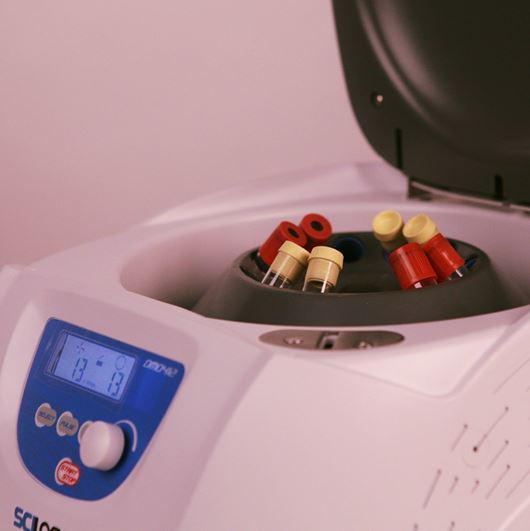
Technical Specifications
The DM0412 uses a higher than standard 300-4500 RPM range, which is great for helping you find the right centrifugal force for a wide variety of samples. The eight-place fixed-angle rotors support standard 15 mL tubes, and can be set with test timers which can be customized between 30 seconds and 99 minutes.
Scilogex follows IEC 61010-2 and 61010-1 standards, which are the international safety standards for electrical measuring equipment. Their DM0412 uses a wide-bodied and low-profile design, sitting at 5.5 x 10 x 11-inches. Along with the centrifuge you’ll receive a dozen adapter plugs and a dozen vacu-tube adapters, as well as the 110/240V US-style power cord and operating instructions.
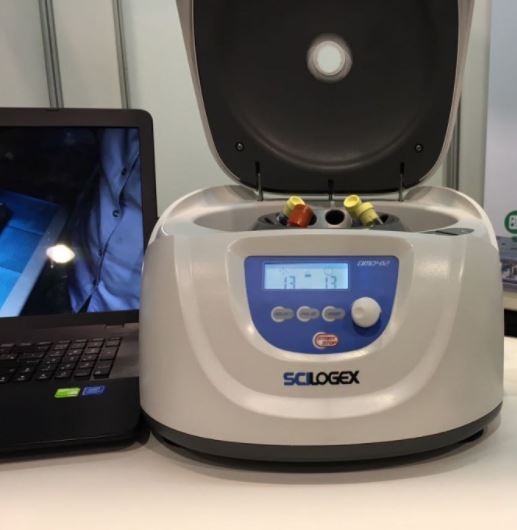
Build & Design
The overall build quality is top-notch with high-end materials utilized throughout. On the front, you’ll find a black and white LCD that displays all of the most relevant information that you need. The streamlined design provides simplicity and plenty of functionality when you need to adjust and configure its wide array of settings.
The DM0412 is built for accuracy but also boasts some added features that we found important. One nice thing was that the machine automatically releases lid when operation has stopped, adding a bit of safety when a user has completed the task at hand.
ELMI CM-7S Clinical PRP Benchtop Centrifuge
The ELMI CM-7S is specialized testing equipment. It uses a motor based on proprietary SkySpin technology, which give a stunningly responsive feedback for acceleration and deceleration. For maximum versatility, the CM-72 was made ready to operate in a cold room or refrigerator. And it’s been built with safety in mind, including an automatic locking transparent lid, which can help you see any potentially damaged sample tubes before you even open the machine.
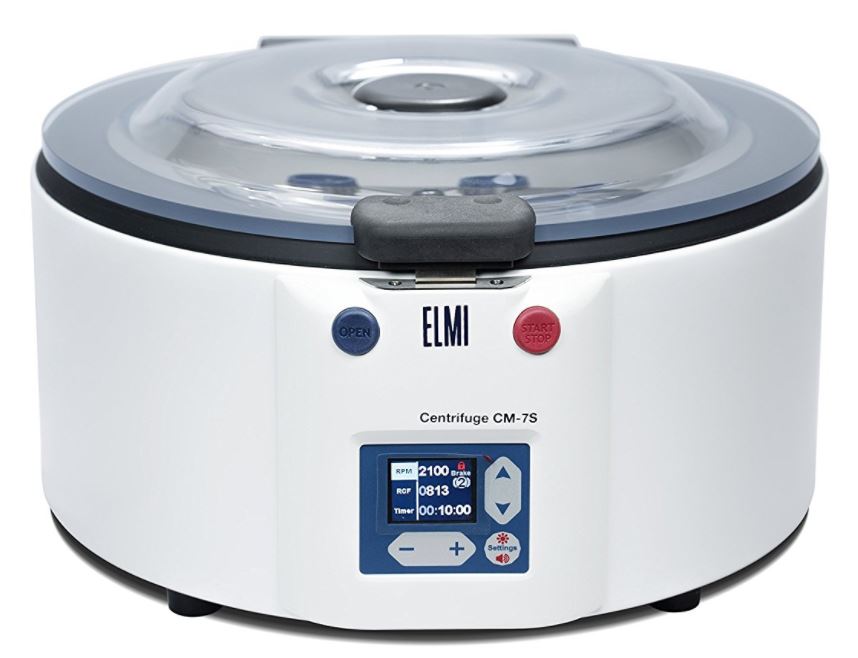
Technical Specifications
The SkySpin motor has a greater degree of control than devices like the Scilogex DM0412, but it has nowhere near the same maximum speed, capping out around 3,500 RPM. That means the maximum centrifugal forces you can achieve are also relatively lower, close to 2300 RCF. On the other hand, the CM-7S has an adjustable breaking feature which can help you get your samples faster, allowing you to move from test to test.
The included rotor spins six 50 mL tubes, but can be extended. That’s because the CM-7S is compatible with four swing-out rotors that are interchangeable, as well as a variety of adapters that can make it even more expandable. Those four options include a dozen 15mL tubes, four 50mL tubes, two dozen 15 mL tubes, and two 96-well plates.
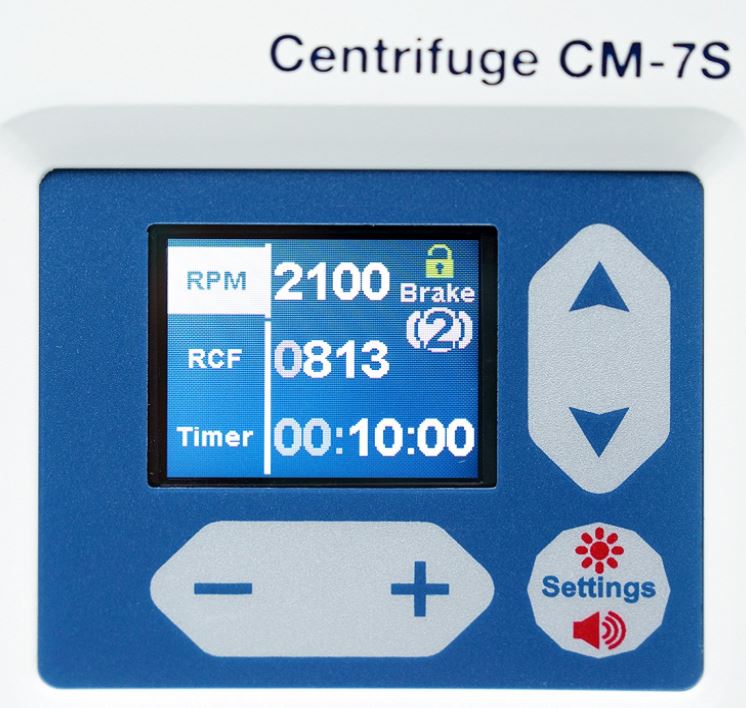
Build & Design
The front LCD is bright and colorful, and provides an increased level of customization and control to the typical centrifuge design. You’ll have to dig through some menus in the LCD to fine-tune the tests to your preferences, but this display is definitely one of the easiest centrifuges to navigate. And the settings button is joined with two sets of arrow keys that can be used to intuitively navigate through the options.
For added safety, the CM-7S will stop and open if the rotor becomes imbalanced. Rubberized stop/start buttons make operation of this centrifuge relatively easy. And the stalky 7.3 x 16.9 x 15.7-inch build makes for a compact and versatile design that can be tucked away and stored easily in even the most crowded laboratories.
Eppendorf 5424 Microcentrifuge
The Eppendorf 5424 is well equipped for molecular biology and other precision measurement. For typical clinical applications, this centrifuge has far more power than you’ll ever need. It also has far less space, using a micro design that’s oriented towards smaller and more highly controlled samples. Capacities aside, the Eppendorf 5224 is built to last, with a smart design that helps ensure a lengthy compressor lifespan.
If you’re working with MiniPrep spin column kits, as you often do with a Microcentrifuge, then you’re going to have to deal with the possibility of tube lids that shear off during elution. Tube lids are ejected when a rotor doesn’t provide the appropriate degree of support for a tube lid undergoing extreme forces. Unlike many micro builds, the 5224 uses an extended rim to help tube caps safely rest during centrifugation, ensuring they won’t be torn off by sheer forces.
Technical Specifications
The 5424 has an incredibly wide range of operation, including a 100 to 14,680 RPM range of speed. That speed results in a maximum RCF of 21,130 x G. RPM can be increased in steps of 50 at a time, unlike most machines which move in intervals of 100.
And Eppendorf has built in a pre-cooling function that can quickly move from -21 °C to 4 °C in as little as 8 minutes. Promises a guaranteed 4 °C during maximum rotational speed. The rotor supports 24 places of relatively small 1.5 or 2.0 mL tubes, as well as a wide range of operation from -10 °C to 40 °C.
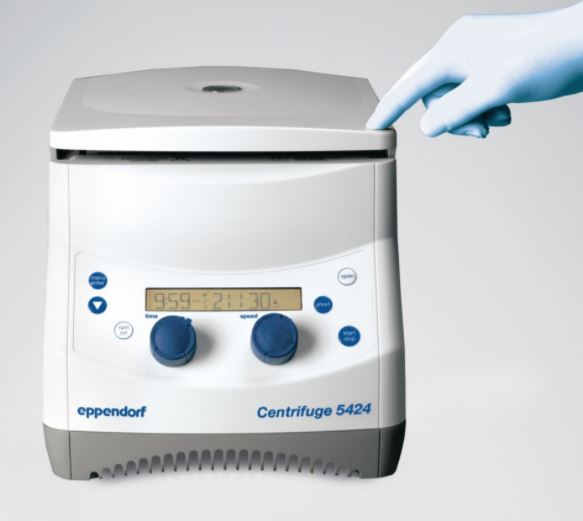
Build & Design
Like you want from a microcentrifuge or any other device dealing with small samples, this model includes efficient cooling to better match room temperature, and maintain accuracy of your temperatures to protect results. Because it was made for dealing with cool temperatures, the 5424 includes a condensation drain that’s been built into the device to deal with water accumulating inside the rotor’s chamber. It makes use of proprietary technology to cut down on vibrations to protect small samples from contamination.
Using a soft break, you can achieve roughly a 16 second acceleration and deceleration time, which is extremely speedy by any standards. And the 5424 uses a special bowl design to ensure quiet operation even without a lid being used on the rotor. Total produced noise level is less than 51dB with the standard induced rotor, ensuring operation doesn’t end up disturbing anyone else in the lab.
Choosing Between 3 Best Centrifuges
The Scilogex DM0412 is a centrifuge that would be welcome in clinics and similar common-use settings. The plastic design doesn’t inspire confidence at first, but the DM0412 lives up to all its claims. If you can do your work within the available 300 rpm to 4,500 RPM range, and you don’t need to worry about adapting the centrifuge to other tasks, then you’ll be perfectly satisfied with the Scilogex DM0412.
But the DM0412 isn’t particularly expandable. If you need a centrifuge that’s capable of taking on a wider variety of challenges, then you want the ELMI CM-7S. It uses a sturdy metal design that can alternate between interchangeable rotors and adapters to keep your centrifuge equipped for almost any challenge.
But some people aren’t dealing with large 15mL samples. For small samples you have entirely different requirements for vibration, speed, and temperature. If 1.5 or 2.0 mL samples are what you’re dealing with, then you need the Eppendorf 5424. It’s some of the highest laboratory grade equipment on the market, boasts an incredible maximum speed, and has all the features you need to test more volatile or delicate substances.
Meet Ry, “TechGuru,” a 36-year-old technology enthusiast with a deep passion for tech innovations. With extensive experience, he specializes in gaming hardware and software, and has expertise in gadgets, custom PCs, and audio.
Besides writing about tech and reviewing new products, he enjoys traveling, hiking, and photography. Committed to keeping up with the latest industry trends, he aims to guide readers in making informed tech decisions.

